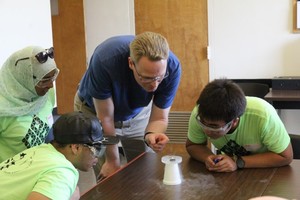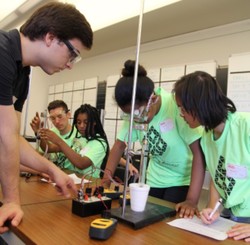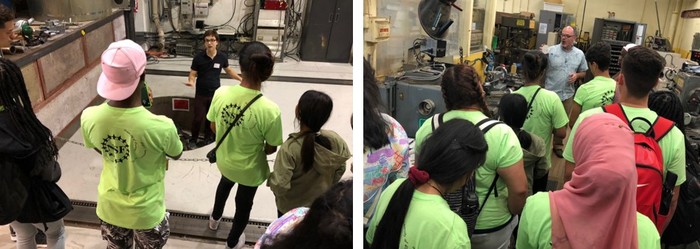CLASSE NEWS | 20 Sep 2018
 The high school students traveled for hours to visit the university, drawn to the campus because of its tremendous science and engineering prospects. The program, Connecting Opportunities, is geared specifically toward Upward Bound participants; students from low-income families and/or high school students from families in which neither parent holds a bachelor's degree. These adolescents recognize the important role higher education can play in their lives, and the U.S. Department of Education funds this free college preparatory program for students who qualify. Participating students were also funded in part by the NSF's Inclusion across the Nation of Communities of Learners of Underrepresented Discoverers in Science and Engineering (INCLUDES) grant and Teaching Excellence Institute in the College of Engineering at Cornell University.
Under the guidance of Maniscalo and Gendler, students measured current flow in two different materials when submerged in liquid nitrogen (70K) to help them understand that some material experience very little electrical resistance at low temperatures. These students compared copper, a popular conductor, to BISCO, a ceramic superconductor with a critical temperature of 110K. The "Too Cool to Resist" activity is part of the high school Lending Library program at CLASSE, developed in part by Dr. Eric Smith, low temperature physics expert at Cornell. Understanding superconducting properties and materials is very importance to the Superconducting Radiofrequency (SRF) group at CLASSE, who exploit the superconducting nature of niobium by creating accelerator cavities that yield net power savings and very high-quality beam attunement (quality factor).
After hearing Maniscalo and CLASSE engineer Adam Holic share information about how the SRF cavities are used at Wilson Laboratory, the students toured the SRF Test Pits and Machine Shop with Tim O'Connell to see first-hand how these cavities are designed, machined and initially tested at Newman Laboratory. "The participation of CLASSE has enriched the lives of Upward Bound students in ways that would not be otherwise possible." Stated Lesa Carter, Program Manager for the Teaching Excellence Institute in the College of Engineering. "It has ignited their interests in academic endeavors."
The high school students traveled for hours to visit the university, drawn to the campus because of its tremendous science and engineering prospects. The program, Connecting Opportunities, is geared specifically toward Upward Bound participants; students from low-income families and/or high school students from families in which neither parent holds a bachelor's degree. These adolescents recognize the important role higher education can play in their lives, and the U.S. Department of Education funds this free college preparatory program for students who qualify. Participating students were also funded in part by the NSF's Inclusion across the Nation of Communities of Learners of Underrepresented Discoverers in Science and Engineering (INCLUDES) grant and Teaching Excellence Institute in the College of Engineering at Cornell University.
Under the guidance of Maniscalo and Gendler, students measured current flow in two different materials when submerged in liquid nitrogen (70K) to help them understand that some material experience very little electrical resistance at low temperatures. These students compared copper, a popular conductor, to BISCO, a ceramic superconductor with a critical temperature of 110K. The "Too Cool to Resist" activity is part of the high school Lending Library program at CLASSE, developed in part by Dr. Eric Smith, low temperature physics expert at Cornell. Understanding superconducting properties and materials is very importance to the Superconducting Radiofrequency (SRF) group at CLASSE, who exploit the superconducting nature of niobium by creating accelerator cavities that yield net power savings and very high-quality beam attunement (quality factor).
After hearing Maniscalo and CLASSE engineer Adam Holic share information about how the SRF cavities are used at Wilson Laboratory, the students toured the SRF Test Pits and Machine Shop with Tim O'Connell to see first-hand how these cavities are designed, machined and initially tested at Newman Laboratory. "The participation of CLASSE has enriched the lives of Upward Bound students in ways that would not be otherwise possible." Stated Lesa Carter, Program Manager for the Teaching Excellence Institute in the College of Engineering. "It has ignited their interests in academic endeavors."
CLASSE is Upward Bound
On a steamy day during the month of July, the third-floor conference room of Newman Laboratory resembled a densely-packed clown car; science-zealous high school students clamored for a seat while their colleagues poured into the room at remarkable pace. Like a game of musical chairs, the number of available seats was just slightly less than the number of eager participants who jockeyed for position around the tables. The event they were attending was not a competitive cakewalk, but a science workshop hosted by graduate students, staff and faculty at the Cornell Laboratory for Accelerator-based Sciences and Education (CLASSE). The visible mist present in the conference room was not caused by the hot, humid temperatures outdoors, but by the boiling off of liquid nitrogen as it warmed rapidly when poured over a ceramic disc placed in a small glass dish. Physics graduate students Naomi Gendler and James Maniscalco knew this activity would grab the students' attention, "Anything involving liquid nitrogen is captivating," said Gendler "It is the hook they need for learning about the Meissner Effect." Professor Matthias Liepe pointed out the unique nature of the black ceramic disk placed in the center of the dish, encouraging the students to observe how the neodymium magnet hovers just above the disc once it has reached the critical temperature required for it to become superconducting.
Professor Matthias Liepe encourages students to make observations about the behavior of a levitating magnet.


